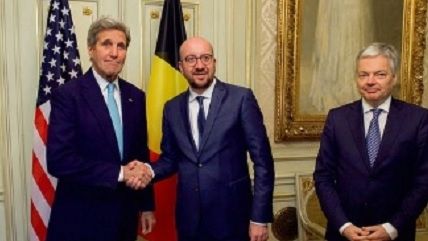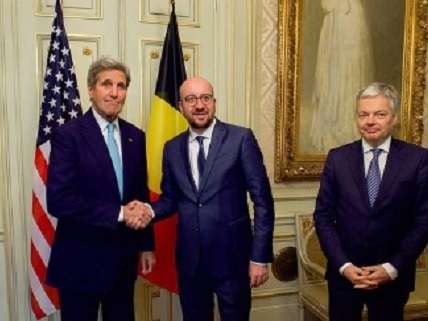John Kerry: ISIS Striking in Europe Because It's Losing Its 'Fantasy' of a Caliphate in Middle East
John Kerry visiting Belgium after terror attacks


Secretary of State John Kerry visited Belgium in the wake of the Brussels terrorist attack, as the Belgian government faces pressure from other European countries and the United States to scale up its counterterrorism efforts.
"It is very important for us today to receive your support," said the Belgian prime minister, Charles Michel, as he acknowledged that Belgium needed "to accept that we need to improve the fight against terrorism in Europe and in Belgium."
While in Belgium, Kerry said ISIS was striking in Europe because "its fantasy of a caliphate is collapsing before their eyes."
"It's territory is shrinking. Its leaders are decimated. Its revenue sources are dwindling, and its fighters are fleeing," Kerry said. The Pentagon announced earlier today that the ISIS finance minister was killed in an operation intended to take him alive for questioning.
Critics of the Belgian counter-terror effort point to what they call an under budgeted and poorly trained security force in that country, as well as laws that, for example, prohibit police from raiding residences between 9 p.m. and 5 a.m. unless a crime is being committed, and prohibit intelligence services from sharing information about Belgian nationals with other countries. Law enforcement agencies in Belgium are a "patchwork" of regional and federal agencies that speak either Dutch or Flemish.
Kerry called the "carping" over possible missed opportunities to stop the Brussels suicide bombers "frantic and inappropriate" four days after the attack.
Reuters reports on U.S. counterterrorism officials that blame cultural differences between the U.S. and Europe and "Europe's deeper commitment to personal privacy" that "sometimes prevents or delays sharing of information such as travel data," which is "taken for granted in the United States."
France has been in a state of emergency since the November ISIS Paris attacks, one that offers law enforcement vast detention powers the Socialist government is looking to make permanent.
Counter-terrorism authorities in Belgium raided an apartment last week in connection with the Paris attacks—a gun fight left one suspect dead and another, Salah Abdeslam, briefly on the run. Authorities now believe one of Monday's suicide bombers was Najim Laachraoui, a Belgian citizen and Abdeslam's alleged bomb maker. Laachraoui is believed to have trained in Syria in 2013. Turkey, meanwhile, says it warned Belgium about the other suicide bomber, Ibrahim El Bakraoui, another Belgian national, labelling him a "foreign terrorist fighter."
The AP reported on warnings from anonymous counterterrorism officials, and a French lawmaker, last week that ISIS could have sent at least 400 fighters to Europe. More than 500 Belgian nationals have travelled to Syria and Iraq, according to terrorism analysts, usually to fight ISIS, and are the top source of Western foreign fighters in Syria on a per capita basis.
Counterterrorism raids continued in Belgium today, with bomb detection units deployed and police wounding and arresting one suspect near a Brussels bomb factory.
French authorities say they made an arrest last night in a terrorist operation in its "advanced stages" but say they haven't connected the suspect to the networks authorities are linking the Paris and Brussels attacks to.


Show Comments (80)